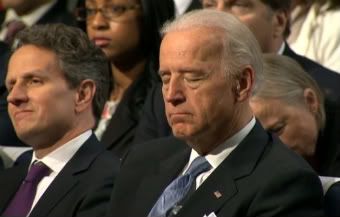Dr. StrangeBiden, or: How I Learned to Stop Worrying and Love the Debt Ceiling*
By
Kyle Andrejczyk
Posted:
|
Budget Process
 Several folks wrote to me this past week with questions about all the debt ceiling talk going on in
Washington right now. But first, let me ask all of you something:
Several folks wrote to me this past week with questions about all the debt ceiling talk going on in
Washington right now. But first, let me ask all of you something:
Can you feel it? That electric tingle in the air? The almost palpable feeling of magic and wonder reminiscent of youthful summer days...days spent fawning over Winnie Cooper and listening to Joe Cocker's cover of “With a Little Help from my Friends?” Wait...that's actually just the opening credits to The Wonder Years. Anyways, it's that special time of year again: Flag Day. But this year is different because Flag Day is but a back drop to something even more exciting — an acceleration of Congressional deficit reduction talks!
This year's Flag Day (Tuesday), marks the first day of a 3-day marathon of meetings for the Biden Group — six Congressmen and Senators led by the Vice President and tasked with developing a long-term deficit reduction plan. The group includes Representatives Jim Clyburn (D-SC), Chris Van Hollen (D-MD), and Eric Cantor (R-VA), and Senators John Kyl (R-AZ), Daniel Inouye (D-HI), and Max Baucus (D-MT).

The Biden Group (Wayne Arnold = Young Joe Biden)
You may well ask yourself, how did I get here? - David Byrne
Well, the reason these discussions are happening is because of Treasury Secretary Tim Geithner's warning that the US will default on its debt obligations if Congress fails to raise the debt ceiling by August 2. The debt ceiling is an arbitrary limit on the amount of money our country can borrow. Right now we're essentially at the $14.3 trillion limit. Time is running out and in order to avoid defaulting on our debt, we need to borrow more money.** And the only people who can green-light that are our members of Congress (the same group of people who took nearly 10-years to grant health benefits to 9/11 first responders — start dusting off that “Will Govern for Food” sign, Uncle Sam).
The problem here is that is that if we default on our debt President Obama won't be getting calls from collections agencies 4 times a day (Remember that Sears card you forgot to payoff? Sure that promotional discount sounded good at the time, but you hardly ever use that thing!) Instead, the entire U.S. government's credit rating will be downgraded, sending shock waves throughout the world economy. The Great Recession of 2008 was caused by handful of private financial firms going belly up. Now imagine the government of the most powerful economy in the world being declared a shaky investment. The resulting panic would be of a scale not seen since that ice-cream truck parked next to your kid's little league game.

"Listen China, I already told you I don't have your money...well whaddya want me to do??"
So why doesn't Congress just raise the debt ceiling?
Well...it has in the past. Many times in fact. It's a fairly procedural process, Congress just has to say “okay, let's raise it.” (Check out this video of our Debt Ceiling Webinar, in a few minutes you'll be an expert). The thing is, that's not going to happen this time around. This is a crucial moment that will determine the future direction of our country, and there's simply too much political leverage to be had. Conservatives have declared from the start that they will not support increasing the debt ceiling without seeing commensurate cuts in spending. And they will not support balancing the budget through increasing revenues (i.e. tax hikes). So to respond to your Facebook post John B.L., that has framed the debate: what's going to get cut? What are our national priorities? Here's what they currently are, but what are they going to be? And how are we going to decide?
Enter the Gang of Six.
Several months back a bipartisan group of six senators joined forces in the name of Truth, Justice, and the Fiscally Responsible Way. The Gang used recommendations made by Obama's National Commission on Fiscal Responsibility and Reform as a jumping off point for saving more than $4 trillion dollars over ten years. Keep in mind, the federal government spends roughly $3.7 trillion in one year. What makes the Gang different from the Biden Group is that everything is on the table for them: spending cuts, revenue increases, and savings through entitlement programs like Medicare. Things were going swimmingly until Senator Tom Coburn (R-OK) left the group in mid-May after becoming increasingly frustrated with how the negotiations were proceeding.

"Today, a day which will live in infamy, Tom Coburn announced he is taking his ball and going home."
The now Gang of Five is still meeting and has announced a plan that could cut $4.7 trillion over the next decade. The remaining Gang is being led by Senators Saxby Chambliss (R-GA) and Mark Warner (D-VA), and includes Mike Crapo (R-ID), Dick Durbin (D-IL), and Kent Conrad (D-ND).
Around the time the Gang was splintering, the Biden Group was just getting started. Since then, much faith has been placed in the Biden Group. Which is surprising, to say the least, given Biden's reaction to the President's announcement that he would be pulled away from his regular duties to lead the group:

"Hey Timbo, wake me up when this things over."
Unlike the Gang, the Group is much more narrow and limited in its discussion. Whereas as the Gang was discussing all possible options, the Group seems unwilling (for political expediency) to tinker with tax increases (although closing tax loopholes is still an option) or entitlement programs (like Social Security). Instead the talks have mostly been about how to cut discretionary domestic spending. So far the Group has allegedly agreed upon roughly $1 trillion in spending reductions over the next several years. However, this is far short of the $4 trillion in savings the GOP is looking for. And with a self-imposed deadline of July 1, the Group still has a long way to go. The Group is ratcheting up the pace of its talks this week with 3 meetings in hopes of tackling the more divisive issues.
A lot of ideas have been popping up in the news lately, including a cap on discretionary spending (i.e. spending only 18-20% of GDP), a balanced budget amendment to the Constitution (checkout this great piece by the indefatigable Isabelle), and switching to a 2-year appropriations process instead of an annual one. All of which seem fairly unlikely at this point.
The real questions now is what's going to get cut? Unfortunately, details surrounding the Gang and Group talks have been decidedly guarded, almost secretive. But raising the debt ceiling will depend on how palatable their plans are to our more fiscally conservative members of Congress. For now, we will have to wait until their plans are unveiled to know what the future holds for us — will it be one of austerity, or one of comfort and prosperity?

1st Rule of the Biden Group. Don't talk about the Biden Group.
Want to “Ask Kyle” a question on this or anything else? Send it to questions@nationalpriorities.org or post your “Ask Kyle” questions on Facebook at www.facebook.com/nationalpriorities.
UPDATE 6/23: House Majority Leader Eric Cantor has left the Biden group over a disagreement on the issue of increasing revenue through taxes. While Cantor says the talks have established a "blue print" for going forward, his departure highlights the ideological differences between the two parties, and serves as a precursor to the heated debates to come when budget talks reach both houses of Congress.
*Apologies, Kubrick
**There is a difference between “the debt” and “the deficit.” The debt is how much money we owe all together, around $14.3 trillion right now. The deficit is how much we're short by in any given year, i.e. if the government takes in less money than it spends in any given year, it's running a deficit. To make up for this shortfall we need to borrow money, which adds to our total debt. So running a deficit increases our total debt. To payoff our debt, we need to reduce deficit spending. Remember, deficit is yearly and debt is total.